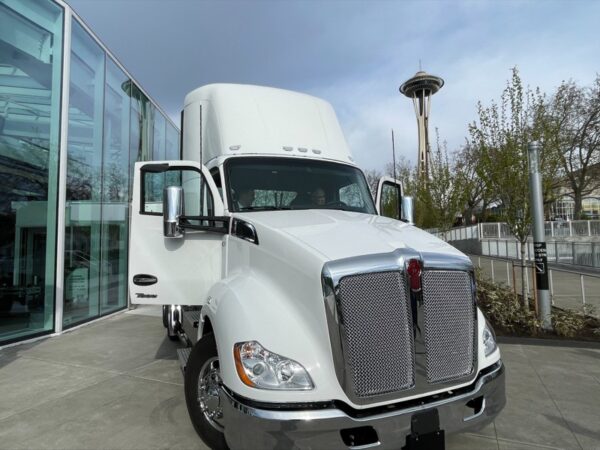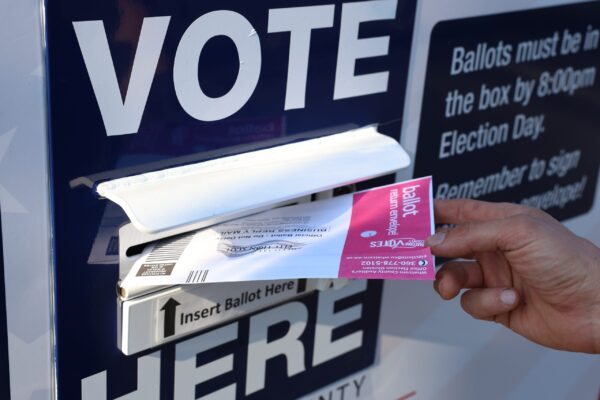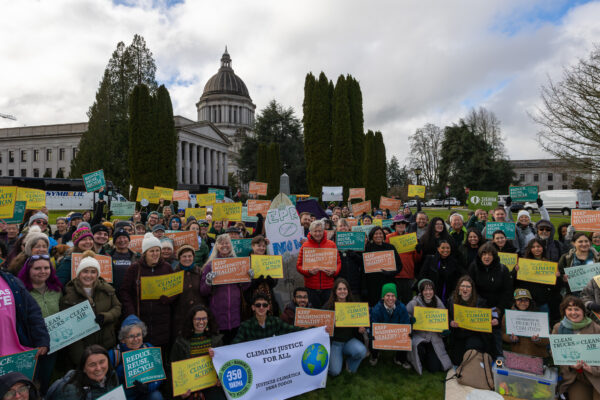December 18, 2023, DNR announced 2,000 acres of mature, structurally complex forests would be conserved in perpetuity
We are still reviewing all the details of this deal, but our initial analysis is that this is a big win for people, for the climate, for Washington’s unique forestlands, and for logging communities.
Washington Conservation Action, along with partners Conservation Northwest and the Center for Responsible Forestry, fought fiercely in the 2023 legislative session to preserve these special forestlands. Our work resulted in $83 million dollars to set aside these 2,000 acres, as well as to purchase working timberlands to replace the conserved forests.
“These forests are an irreplaceable asset in mitigating the impacts of climate change. We are proud of all the work Washington Conservation Action and our partners have done in reaching this milestone, and we look forward to reviewing DNR’s nominated acres to ensure our state’s Climate Commitment Act funds are being used to maximize conservation of structurally complex forests and promote long-term carbon storage,” said Rachel Baker, Forest Program Director, Washington Conservation Action.
This means that older forests can continue to grow generation after generation, providing critical habitat for wildlife, shading salmon streams, and storing planet-warming carbon in their wood, roots, leaves, and soils. At the same time, the replacement acres will provide livelihoods for working families in timber communities.
Here’s why this is a good thing for both nature and for communities:
Conserving Mature Forests on DNR Trust Land
WCA, along with partners Conservation Northwest, the Center for Responsible Forestry and our legislative allies, worked hard throughout the 2023 session to conserve these important forests.
Forests slow and mitigate the damage of climate change. As trees grow, they remove atmospheric carbon from the air. That carbon is stored long term in the trees, roots, plants, and soils of the forest. Washington’s forests covering almost half the state’s landscape. They create an excellent natural climate solution (NCS) for reducing carbon released into the atmosphere.
In Washington’s 2023 state budget, the Carbon Sequestration Forests proviso (Chapter 474, Laws of 2023, Section 3130) appropriates $83 million from the Natural Climate Solutions account to promote carbon storage in forests managed by the Department of Natural Resources. $70 million of those funds go directly to conserving and expanding DNR’s forested land base.
Of the 2.3 million acres of DNR managed forests, less than 3% is structurally complex, carbon-dense forests in DNR’s portfolio of state trust lands. In recent years, people have become aware of the wholesale harvest of these acres, and of the need to protect them. This began with small grassroots activism and grew into a statewide clarion call. This advocacy culminated in a mandate from the legislature, in the form of this proviso.
The Carbon Sequestration Forests proviso is the largest allocation of NCS funds to date. It affirms the vital role forests play in achieving Washington’s greenhouse gas emissions goals. Not only this, it represents a visionary and valuable investment for funds generated by the Climate Commitment Act, the state’s historic 2021 cap-and-invest law. It demonstrates that DNR can manage state trust lands for public benefit beyond harvesting timber.
Achievements of the Proviso
2,000 acres conserved
DNR has identified 2,000 acres of structurally complex, carbon dense forests on state trust lands to conserve in perpetuity. If not for the proviso, many of these mature forests would have been logged in the next decade. Harvest releases much of the carbon stored by the forests into the atmosphere. But now that the conserved forests will continue to grow, they will continue to store the carbon they contain. And they will remove more carbon from the atmosphere for centuries to come.
8 counties in total requested DNR conserve mature forests on trust lands within their county: Whatcom, Snohomish, King, Pierce, Thurston, Kitsap, Jefferson, and Clallam. The total request from counties was much greater than the 2,000 allowed by the proviso, showing how much interest there is in this type of conservation.
DNR nominated forests in five counties for conservation: Jefferson (950 acres), Whatcom (650 acres), King (290 acres), Snohomish (70 acres), and Clallam (69 acres). Once approved by the Board of Natural Resources, they will never be logged commercially. DNR can transfer these forests out of trust status once it has finalized the acquisition of replacement acres of equal value. The replacement acres will be added to state trust lands.
9,000+ Acres Acquired
DNR has begun an acquisition of forested acres in southwest Washington that achieves multiple important goals. This includes 9,115 acres of highly productive private forestlands in Wahkiakum County. Of these, 8,174 acres have been approved for purchase using $47.8 million of the proviso funds. Some portion of these acres will be used as replacement for the 2,000 acres.
Because the 2,000 acres to be conserved include many large-diameter mature trees, the market value of that timber makes those acres much more valuable than an acre of young trees not yet ready for commercial harvest. That’s why DNR must acquire a lot more than 2,000 acres to replace the total value for the trust.
Economically sustainable
Timber is an important component of rural economies in Washington, the cost of transporting logs long distances means logging, mills, and manufacturing are very locally dependent. Maintaining forest timber operations in Wahkiakum supports rural livelihoods.
Many acres of DNR trust lands provide habitat for two endangered species: the northern spotted owl, and the marbled murrelet. These forests have some restrictions on logging and are referred to as ‘encumbered lands’. Wahkiakum, Skamania, Pacific, Clallam, and Jefferson Counties all have encumbered lands. DNR follows stricter environmental protections than do conventional industrial forest operations. As a result, moving the acquired acres into DNR management will provide greater climate benefit.
The Work Goes on
Forests are the heart of the Evergreen State. They clean the air by taking in CO2 and releasing oxygen. They clean water by filtering runoff and shading streams. They store carbon above and below ground, mitigating the impacts of climate change. Healthy forests benefit all the people of Washington.
WCA has been working hard to ensure these forests are there for the future. But we couldn’t do this without the hard work of our champions in the legislature. Please take a moment to thank Christine Rolfes, formerly a state senator for the 23rd District and now a Kitsap County Commissioner, for all her hard work on this visionary proviso!
Conserving these mature forests and expanding DNR’s forested land base would not have been possible without funds provided by Washington’s Climate Commitment Act (CCA), the historic 2021 cap-and-invest carbon law that that Washington Conservation Action worked hard to pass. CCA funds are a vital support mechanism for many of the projects WCA supports to ensure healthy forests, clean air and water, and equitable access for all Washingtonians.
Your donation ensures a sustainable future.



